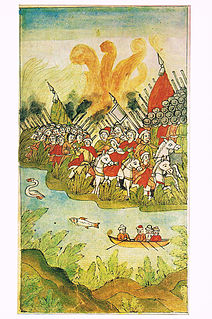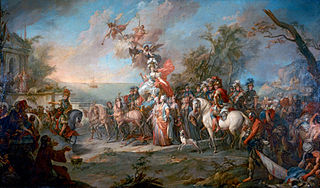 W
WThe Crimean campaigns of 1687 and 1689 were two military campaigns of the Tsardom of Russia against the Crimean Khanate. They were a part of the Russo-Turkish War (1686–1700) and Russo-Crimean Wars. These were the first Russian forces to come close to Crimea since 1569. They failed due to poor planning and the practical problem of moving such a large force across the steppe but nonetheless played a key role in halting the Ottoman expansion in Europe. The campaigns came as a surprise for the Ottoman leadership, spoiled its plans to invade Poland and Hungary and forced it to move significant forces from Europe to the east, which greatly helped the League in its struggle against the Ottomans.
 W
WFor over three centuries, the military of the Crimean Khanate and the Nogai Horde conducted slave raids primarily in lands controlled by Russia and Lithuania-Poland as well as other territories. These raids began after Crimea became independent about 1441 and lasted until the peninsula came under Russian control in 1774.
 W
WThe Great Turkish War or the War of the Holy League was a series of conflicts between the Ottoman Empire and the Holy League consisting of the Habsburg Monarchy, Poland-Lithuania, Venice and Russia. Intensive fighting began in 1683 and ended with the signing of the Treaty of Karlowitz in 1699. The war was a defeat for the Ottoman Empire, which for the first time lost large amounts of territory. It lost lands in Hungary and the Polish–Lithuanian Commonwealth, as well as part of the western Balkans. The war was also significant in that it marked the first time Russia was involved in a western European alliance.
 W
WThe Ottoman–Persian War was a conflict between the forces of the Safavid Empire and those of the Ottoman Empire from 1730 to 1735. After Ottoman support had failed to keep the Ghilzai Afghan invaders on the Persian throne, the Ottoman possessions in western Persia, which were granted to them by the Hotaki dynasty, came under risk of re-incorporation into the newly resurgent Persian Empire. The talented Safavid general, Nader, gave the Ottomans an ultimatum to withdraw, which the Ottomans chose to ignore. A series of campaigns followed, with each side gaining the upper hand in a succession of tumultuous events that spanned half a decade. Finally, the Persian victory at Yeghevard made the Ottomans sue for peace and recognize Persian territorial integrity and Persian hegemony over the Caucasus.
 W
WPolish-Cossack-Tatar War was the war between the Polish-Lithuanian Commonwealth and the Ottoman Empire over Ukraine. It was one of the aftermaths of the Russo-Polish War (1654–1667) and a prelude to the Polish–Ottoman War (1672–1676).
 W
WThe Russo-Turkish War of 1676–1681, a war between the Tsardom of Russia and Ottoman Empire, caused by Turkish expansionism in the second half of the 17th century.
 W
WThe Russo-Turkish War of 1686–1700 was part of the joint European effort to confront the Ottoman Empire. The larger European conflict was known as the Great Turkish War.
 W
WThe Russo-Turkish War of 1768–1774 was a major armed conflict that saw Russian arms largely victorious against the Ottoman Empire. Russia's victory brought Kabardia, part of Moldavia, the Yedisan between the rivers Bug and Dnieper, and Crimea into the Russian sphere of influence. Though a series of victories accrued by the Russian Empire led to substantial territorial conquests, including direct conquest over much of the Pontic–Caspian steppe, less Ottoman territory was directly annexed than might otherwise be expected due to a complex struggle within the European diplomatic system to maintain a balance of power that was acceptable to other European states and avoided direct Russian hegemony over Eastern Europe.
 W
WThe Russo-Turkish War of 1787–1792 involved an unsuccessful attempt by the Ottoman Empire to regain lands lost to the Russian Empire in the course of the previous Russo-Turkish War (1768–1774). It took place concomitantly with the Austro-Turkish War (1788–1791).